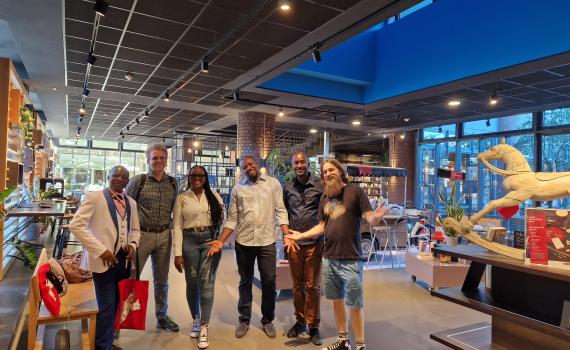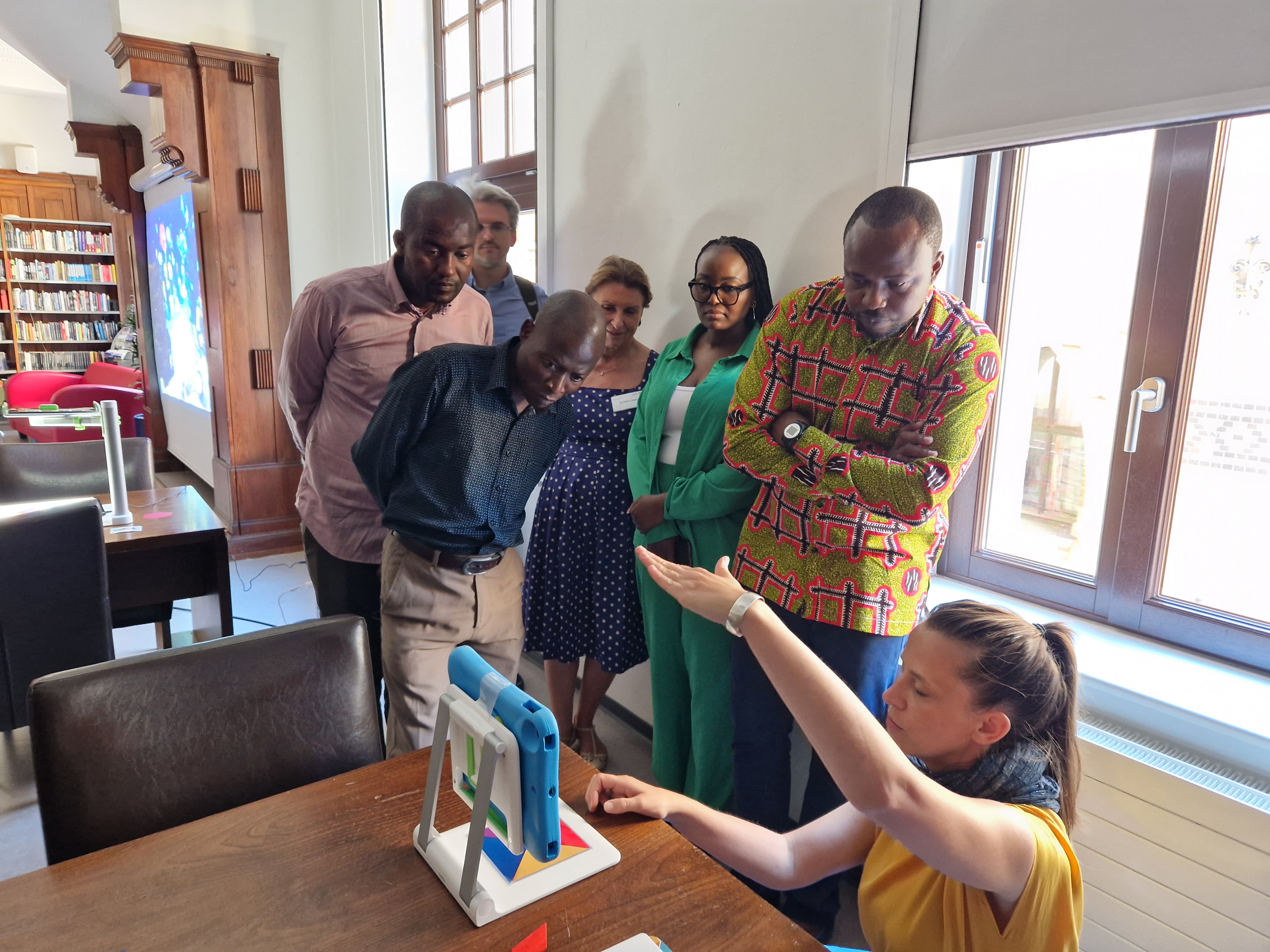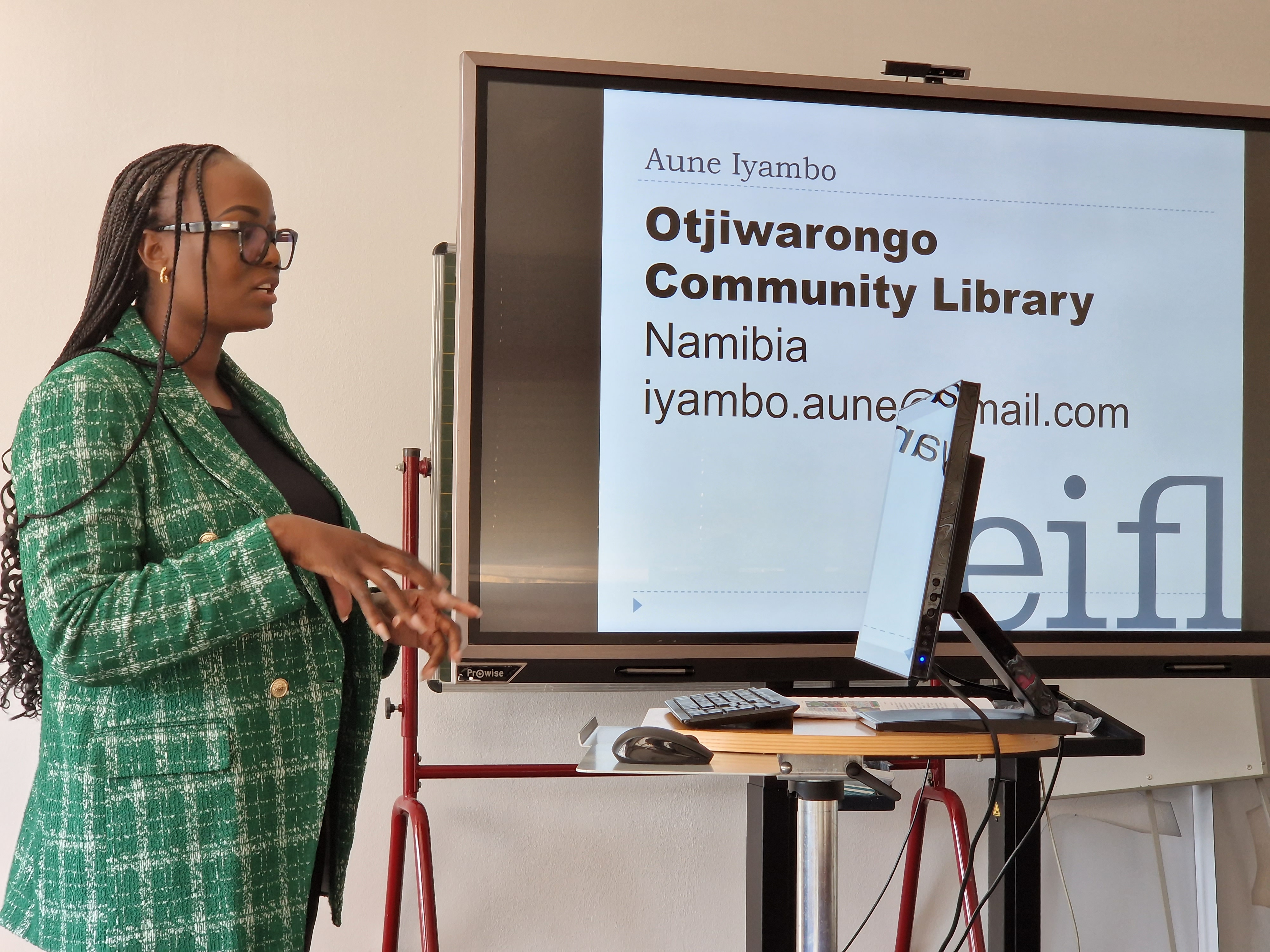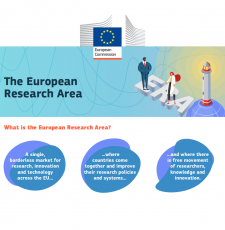
From 3 - 8 September 2023 four public librarians, from Ghana, Kenya, Namibia and Uganda, took part in the EIFL Initiative for Young African Library Innovators (IYALI 2023) learning experience in Germany. Ramune Petuchovaite, Manager of the EIFL Public Library Innovation Programme, who accompanied the group, asked the four librarians what inspired them most during their journey.
The four EIFL IYALI 2023 participants were, Franklin Mutuma Kiriinya, Head of Timau Community Library at the Kenya National Library Service; Evans Kofi Korletey-Tene, Regional Librarian at Ghana Library Authority / Eastern Region Library; Aune Ndapewa Naambo, Chief Librarian of Otjozondjupa Regional Library / Namibia Library and Archives Service, and Mathew Olowo, librarian at Bugiri Public Library in Uganda.
In five days, they traveled over 1,000 km to complete an intensive learning experience that included visiting libraries in Cologne, Bremen, and Frankfurt on the Main, and engaging with German librarians, library leaders and library partners in round-table discussions and knowledge exchange about innovative library services and activities.
Redesigning library spaces for local needs
The four visitors were especially inspired by the ways in which public libraries in Germany build partnerships with other local services and organizations, and involve volunteers and community members to co-create library spaces and services that are truly local.
Bremen City Library features works by local artists: “The art objects we saw there are not just for decoration, they make the library a more meaningful space in the community by telling local people’s stories and showing community identity by featuring real people’s portraits. I will definitely think of something similar in Bugiri,” said Mathew Olowo from Uganda.
Exploration of how the libraries they visited are guided by ‘a third place’ theory caught the attention of Franklin Mutuma Kiriinya from Kenya.
“Unlike the home (the first place) and workplace or school (the second place), where everyone has certain roles and obligations, the third place offers neutral ground for people to spend their time, meet and interact with others and build feelings of belonging in the community. In Kenya public library services have recently been transferred to County Governments, so I am at the point of re-thinking my library’s future. The ‘third place’ idea of building a community around the library, and the other way around, for the library to open to different community needs, is very handy and came just at the right time,” he said.
“I learned about the library as a living room concept in the Kalk branch of Cologne City Library. The library offers cozy and inviting space to be used by the community for reading, but also many other different purposes,” said Evans Kofi Korletey-Tene, from Ghana.
Evans also observed that all the libraries he visited in Germany have attractive children’s sections. “In Bremen city library I was inspired by a space set up in a child-friendly manner – with child-eye level shelves, colorful furniture, and pictorial information signage – everything designed to encourage children’s independent explorations of the library space, resources and programmes.” 
Aune Ndapewa Naambo, from Namibia, recalled the words of Dr Hannelore Vogt, Director of the Cologne City Library, in her address to the IYALI group: “Libraries are places to meet, places to do things, places to learn, and places to get inspired.”
“At every library we visited I saw this vision of a present-day public library come true,” said Aune.
Working with communities on library programmes
Aune Ndapewa Naambo observed that librarians in Germany are working closely with communities to address diverse interests and needs. Among strategies is to engage volunteers from the community to co-organize projects and facilitate training workshops. It’s a win-win: the volunteers are keen to share their skills and competencies with others, and there is less pressure on library staff to know and do everything.
“All the libraries we visited involve the community in the development of new library services, such as all kinds of educational programmes around Maker Spaces or the Library of Objects. I'm referring to the library having sewing machines, TV cables, welding equipment, pianos, music instruments, and 3D printers, to mention a few examples. Some of these items can be borrowed, some can be used at the library, where users are allowed to explore on their own, using self-help guides developed by librarians or community volunteers,” said Aune.
Gröpelingen branch of Bremen City Library serves a densely populated, diverse, multicultural district of Bremen, with many Eastern European, Middle Eastern, African and Asian people, who need help with different social, legal and economic issues, for example, visas, employment, accommodation, access to social security, legal support, health and translation of documents. During their visit, the group heard how Gröpelingen library collaborates with local public services and NGOs that can help people in difficult situations, and provides space for group and individual consultations with experts, and, where needed, librarians facilitate meetings.
“The statement by Mr Andreas Gebauer, Head of Gröpelingen District Library in Bremen, that ‘every library’s environment dictates its own networking, collaboration and services’ will go a long way in changing my library’s programmes for the community.
“His viewpoint on a well-connected librarian being instrumental in helping to address social and economic challenges faced by the most vulnerable community members, and earning respect and support from local politicians, made me feel special as a librarian,” said Franklin.
Aune highlighted lessons learned from Barbara Lison of Bremen Public Library about the need to incorporate library services and activities into broader community development agendas.
“I can advocate for library space extension by incorporating our activities into SDGs (the UN Sustainability Goals), and grounding them in the goals and objectives of local government. I believe that putting the community first should speak volumes to politicians,” she said.
The presentation of library events and programming by librarians of Frankfurt on the Main city library was the most relevant and interesting experience for Mathew Olowo from Uganda. “Frankfurt city library network is reaching over 600 participants through some music events or children’s rights campaigns and reading promotion programmes. It made me realize that educational and inspiring library events targeting different age groups can be the answer to my challenge to attract local community members to the library, and perhaps the best strategy to market library services to people,” he said.
Transformative learning experience 
“Visiting different libraries in Germany was an eye-opener for me and has expanded my intellectual capacity to look at things with a fresh mind, and this has undoubtedly affected my previous ways of thinking and doing things,” said Aune.
“I am delighted to say thank you very much for the programme which I believe will be of impact to the community we serve.” said Mathew.
“Despite my qualification as a librarian, IYALI made me feel more qualified,” said Evans.
“The IYALI 2023 programme exceeded my utmost expectations, from an expanded network of colleagues and friends to understanding different cultures, and having learnt a lot from Ghana, Uganda, Namibia, Lithuania and German colleagues. It places me in a better position to be an agent of change. I am talking a lot about what I saw and learnt, and I will walk the talk and apply new ideas in Kenya,” said Franklin.
Thank you to the Cologne, Bremen, and Frankfurt public libraries for their support in planning and organizing IYALI 2023, and to our co-funder in Germany, BI-International, a standing committee of the Bibliothek & Information Deutschland, BID (the Federal Union of German Library Associations).
MORE INFORMATION
Since 2017, 45 young African public librarians from 13 countries have taken part in the EIFL Initiative for Young African Library Innovators, travelling to Eastern Europe (Lithuania, Poland, Romania), Southeast Asia (Malaysia and Indonesia), Denmark, USA and Germany. Many have introduced new services and changes in their libraries, built new partnerships and pursued further international learning and networking opportunities. Some have also advanced to leadership positions in libraries, library governing bodies and library associations.
More about the EIFL Initiative for Young African Library Innovators.
SHARE / PRINT







